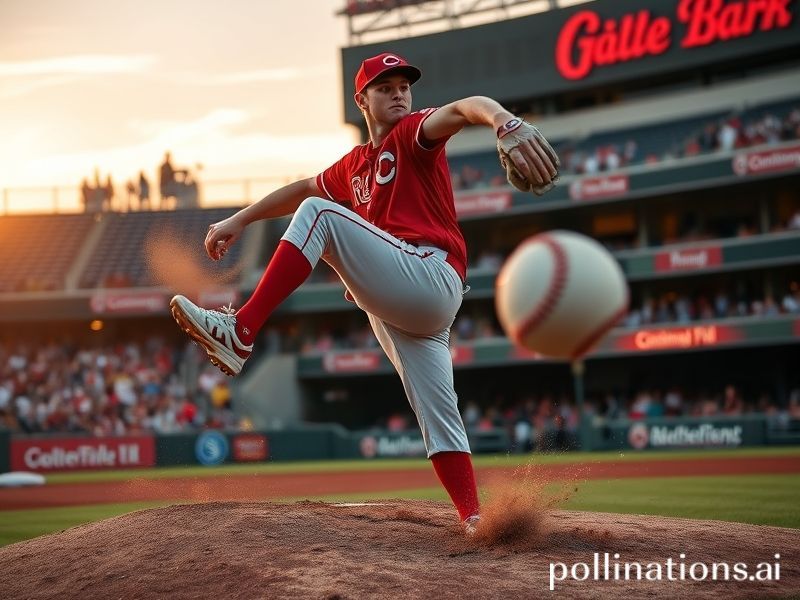Nick Lodolo: The Left-Handed Diplomat Pitching America’s Last Reliable Export
Nick Lodolo and the Great American Pastime’s Global Hangover
By Our Man on the Mound, Somewhere between Cincinnati and the Hague
Somewhere in the bowels of Great American Ball Park, a 6-foot-6 left-hander with a curveball that bends like EU agricultural policy is quietly reminding the planet that the United States still exports something other than inflation and reality-TV diplomacy. His name is Nick Lodolo, and while most of the world was busy devaluing currencies or pretending COP summits matter, he has been perfecting a pitch that looks suspiciously like a metaphor for late-stage capitalism: beautiful, untouchable, and ultimately subject to the whims of an analytics department that thinks sentiment is a rounding error.
Internationally, Lodolo’s rise is less a sports story than a geopolitical footnote—proof that even in an era when the global south can’t reliably get vaccines, the American Midwest can still grow 95-mph fastballs in hydroponic greenhouses. Scouts from Tokyo to Tijuana have downloaded his TrackMan data the way Kremlinologists once parsed May Day photos: Is the spin rate up? Does the slider still obey the laws of Newton? And, most pressing, can any of this be reverse-engineered before the next posting fee deadline?
For the uninitiated, Lodolo is the Cincinnati Reds’ homegrown antidote to tanking, tariffs, and the general sense that civilization peaked somewhere around season three of “The West Wing.” Drafted in 2019 out of TCU—an institution whose initials sound like a failed trade agreement—he spent the pandemic hiatus throwing bullpens in empty stadiums, which, coincidentally, is also how most G7 meetings are conducted these days. He arrived in the majors last season with the enthusiasm of a UN intern and the ERA of a Swiss bank account: deceptively tidy on the surface, hiding a multitude of sins.
Europeans, who prefer their sports socialist and their scoring nil-nil, regard Lodolo with anthropological fascination. Here is a man paid inordinate sums to throw a ball 60 feet, 6 inches, while wearing pajamas stitched by the same supply chains currently asphyxiating Bangladeshi rivers. When Lodolo strikes out a batter, French intellectuals call it “an assertion of individual will over collective destiny”; Reds fans just scream, spill beer, and wonder if the bullpen phone still works. Both reactions are equally valid.
In Asia, where baseball is either a national religion (Japan), a state-sponsored metaphor (South Korea), or the most cinematic way to launder gambling money (parts of China), Lodolo’s mechanics are being dissected by biomechanists who trained on Toyota assembly lines. NPB clubs have already sent emissaries to ask whether Cincinnati would consider a short-term loan, the way one might borrow a cup of genetically modified sugar. The answer, so far, is a polite Midwestern “bless your heart,” which translates roughly to “Show us your entire GDP and we’ll talk.”
Meanwhile, the global south watches with the wry detachment of nations that grew up on grainy VHS highlights of Dwight Gooden. In Venezuela, where inflation now moves faster than Lodolo’s four-seam, kids still mimic his delivery in barrio alleys, substituting taped-up mango pits for baseballs. They understand something MLB owners refuse to admit: talent is universal, but opportunity is gated by passport, portfolio, and the cruel arithmetic of bonus pools.
Not that Lodolo himself indulges in such macro musings. Asked recently about his “international impact,” he blinked the way a golden retriever contemplates cryptocurrency and said he was focused on “getting ahead in the count.” Admirable, really—if only the WTO could adopt the same strategy.
So what does it all mean? Simply this: in a fractured world where supply chains snap like ligaments and every bilateral relationship ends in arbitration, Nick Lodolo’s left arm offers a fleeting illusion of order. For three hours on a humid Midwestern night, borders dissolve, tariffs vanish, and the only trade war involves sliders and changeups. Then the final out is recorded, the stadium lights dim, and we return to our regularly scheduled geopolitical migraine—refreshed, slightly sunburned, and pretending the curveball wasn’t juiced by the same physics that’s melting the Arctic.
Play ball, humanity. You’ll forgive us for enjoying the distraction.







